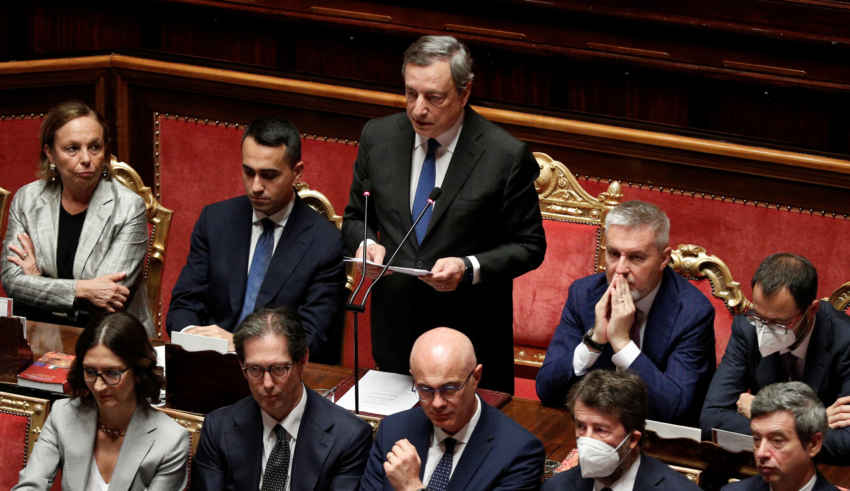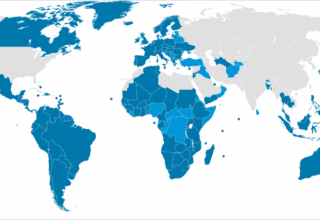
Italy’s role and reputation on the international stage have been unstable – to say the least. The rapid alternation of coalition governments and their inability to come to full term, as well as the long history of scandals and criminal activity tied to the political elites have often made the country a laughingstock for its European neighbours and the rest of the world.
Many saw the appointment of Mario Draghi as Prime Minister in early 2021 as a turning point. His experience as a civil servant and his success as President of the European Central Bank in the aftermath of the 2008 financial crisis made Draghi highly esteemed among other leaders and by much of the population. Despite his advent to office without elections, he brought stability to a country ravaged by the covid-19 pandemic and the subsequent economic crisis and was successful in making Italy a central European power once again. His resignation in July of 2022, therefore, though not unusual in the Italian political scene, left many disappointed and concerned about the future of the country which, as the elections called for September 25th inch closer, appears rather bleak.
While some have called the current political crisis a “Triumph of Democracy”,[1] given Draghi’s advent to power through a direct appointment by President of the Republic Sergio Mattarella, rather than through regular ballot-casting in elections, the fall of Italy’s 67th government since 1946 following the boycott of the confidence vote once again showcases the inherent fragilities of Italian politics – and how they can be leveraged to gain power.
The leaders of the three parties leading the boycott, however, might not be able to use their move to form a government: Berlusconi, Salvini, and Conte will have to face the rising popularity of Brothers of Italy and their forerunner Giorgia Meloni, who is currently considered the most favoured candidate. Meloni’s strategy to win the favour of the Italian people, ultimately gaining her a polling prediction of 23% of the vote, has been well elaborated; after founding her party in 2014 and naming it after the opening lyrics of the national anthem, she made herself an advocate for the voice of the dissatisfied masses of voters, disillusioned by politics that felt to detached from their issues. Simultaneously, her platform, though strongly nationalist and populist, has attracted many who found her approach relatable, down-to-earth, and more “respectable” than that of equally far-right leader Salvini, who built a strongman image that often led him to ridicule. Other right and centre-right parties also carry some major reservations for voters: Berlusconi’s reputation, despite his being one of the only PMs whose government completed the 5-year term, has been irrevocably tainted by the gaffes and scandals he was involved in throughout his political career. Conte from the 5 Star Movement, on the other hand, is blamed by much of the population for the disastrous effects of the covid-19 pandemic, while the left has overall been greatly divided and unable to bring compelling narratives and political programs to the table, leaving a large share of voters factually unrepresented. This scenario paves the way for post-fascist Brothers of Italy to rule the next government – and for Meloni to be the first female premier of Italy.
The future of Italy, however, is cause for concern not only for Italians; rather, Europeans and EU officials as a whole should keep an eye on what happens in Rome. Italy is, in fact, the third biggest economy within the European Union, and one of its central members since its birth. The fragile nature of the Italian economic status, trademarked by its growing public debt, its internal instability and, indeed, the rise of right-wing extremism in the latest years, can make the country a ticking bomb for the overall cohesion of the Union. Draghi’s farewell to the leadership of the country, in fact, already represents a worrisome turn towards populism and, indeed, a step closer to the EU’s current biggest concern – Russia. Forza Italia, M5S, and Lega alike, in fact, have been known to preach the Kremlin in the past and, following the outbreak of the war in Ukraine, have been hesitant and vague in condemning Putin’s actions. Brothers of Italy, on the other hand, has since February taken a strongly pro-NATO and pro-Ukrainian stance; nevertheless, Meloni has consistently been outspoken against the European Union, gaining much of her supporters by pushing an agenda that puts “Italy and Italians first.” The nationalistic message entails the core of Brothers of Italy’s philosophy and Meloni’s public persona: much of her success has stemmed from her ability to make voters feel understood and mirrored in her image as a deeply Italian, traditional family-oriented, Catholic woman. In times of political and economic insecurity, social polarisation, and political instability, she offers the mirage of safety through by pushing anti-immigration, anti-EU, and anti-LGBT+ positions that have become increasingly popular throughout the entire Western world in a concerningly resounding wave of populistic extremism. In fact, Brothers of Italy has enjoyed the support and preach of Spain’s Vox, and shared many views with losing French presidential candidate Marine Le Pen. Meloni, however, has at times taken her position further: she and her party have never clearly distanced themselves from fascism, recalled in Brothers of Italy’s flame symbol, and they have in the past openly homaged Hungary’s Victor Orbán as a role model to take after to improve the situation in Italy.
A win for Brothers of Italy – or for a coalition with their akin right-wing competitors – would likely mean a sharp increase in polarisation, not only among the population but reflected in the country’s policies and laws. On the home front, civil liberties such as LGBT+ rights and access to abortion might be endangered, and regression is foreseeable on in-progress reforms regarding nationality laws such as the proposal for the so-called “Ius Scholae.” Immigration, which is expected to become a progressively more pressing issue given the influx of migrants from conflict areas and because of extreme climate change, will mirror the party’s nationalistic and xenophobic approach in foreign relations. Meloni’s personal dislike for the EU will doubtlessly weaken internal cohesion in the Union, which she hopes to set back to an economic alliance rather than the political and social unitarian bloc that has been in the works for the past decades. Furthermore, the political crisis has drastically reduced the likelihood of the new government being able to compile the necessary budget and reforms for Italy to receive the 248 billion euros granted by the European Union as recovery funds; a lack of continued growth for Italy will not only destabilise the EU’s economy, but also further reduce Italians’ confidence in the Union, and support the already circulating rumours about abandoning the common currency.
Overall, the future of Rome looks grim – as do the consequences for the rest of Europe. Italian left-wing parties should take this opportunity to learn how to truly cater to the needs and view of their country’s population if they do not want to be marginalised in these elections and further loose the confidence of their voters. At the same time, European and Europeanist leaders should brace themselves and put some of their differences aside to pose as a united front against the closing-in trends of extremism, populism, and outright fascism that threaten the continent from all sides, echoing a memory of the past century.
References
Burdeau, C. (2022). Italy’s Draghi resigns, far right in lead to take reins in Rome. Retrieved August 1, 2022, from Courthousenews.com website: https://www.courthousenews.com/italys-draghi-resigns-far-right-in-lead-to-take-reins-in-rome/
Laterza, V. (2022, July 23). Draghi’s fall is a win for Putin – and for the Italian far right. Retrieved August 1, 2022, from Aljazeera.com website: https://www.aljazeera.com/opinions/2022/7/23/draghis-fall-is-a-win-for-putin-and-for-the-italian-far-right
Opinion | Mario Draghi’s Fall Is a Triumph of Democracy, Not a Threat to It. (2022). The New York Times. Retrieved from https://www.nytimes.com/2022/07/27/opinion/italy-draghi-populism.html?searchResultPosition=18
Foglio, I. (2022, April 13). L’Europa secondo Giorgia Meloni. Retrieved August 1, 2022, from @ilfoglio_it website: https://www.ilfoglio.it/politica/2022/04/13/news/l-europa-secondo-meloni-3904915/
Opinion | The Future Is Italy, and It’s Bleak. (2022). The New York Times. Retrieved from https://www.nytimes.com/2022/07/22/opinion/italy-draghi-meloni-government.html?searchResultPosition=1
[1] Opinion | Mario Draghi’s Fall Is a Triumph of Democracy, Not a Threat to It. (2022). The New York Times. Retrieved from https://www.nytimes.com/2022/07/27/opinion/italy-draghi-populism.html?searchResultPosition=18
By The European Institute for International Law and International Relations.















